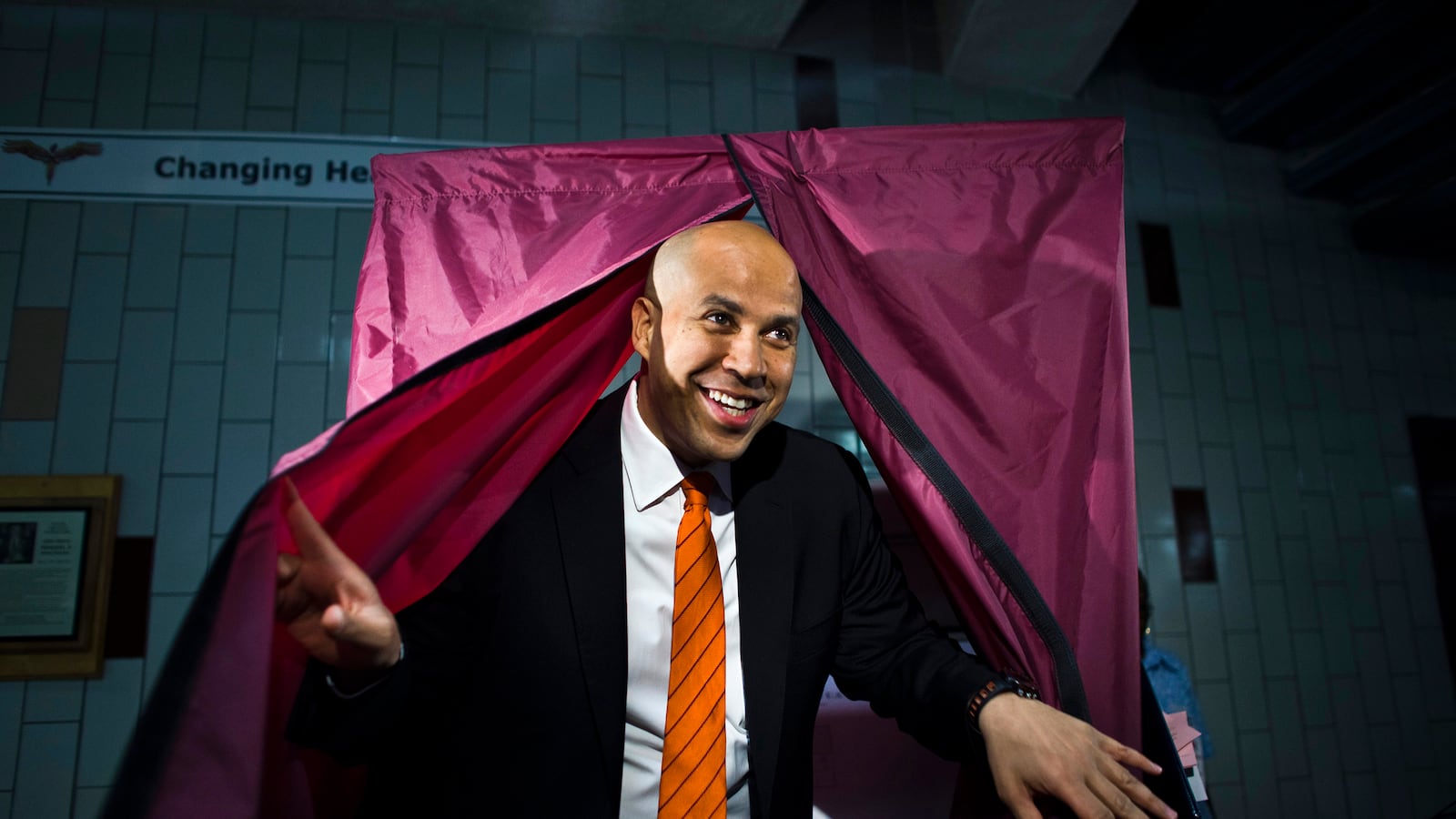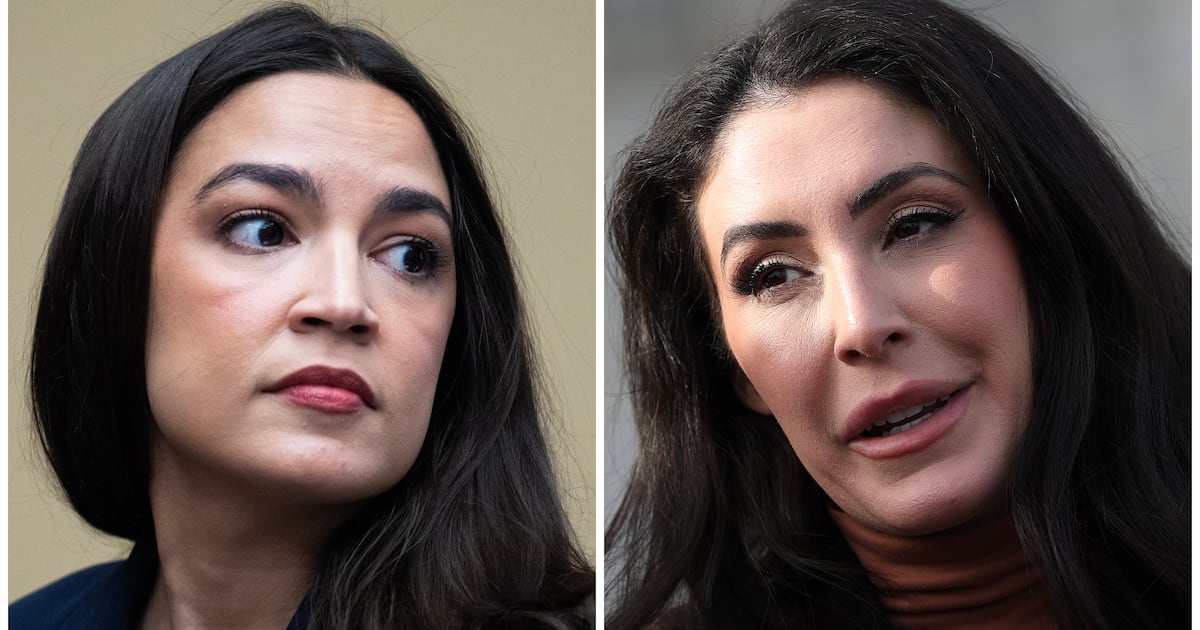Garden Spires, a pair of derelict, high-rise apartment buildings in Newark, New Jersey, were dangerous enough in 1999 that the drug dealers’ henchmen were attacking the security guards. The president of the tenants’ association got into a heated exchange with Cory Booker, then a first-term city councilman, about whether he knew what to do about it.
“We elected you, Cory,” she told him. “If you can’t help, then why did we elect you?”
Booker was 30 years old, a former football player at Stanford, a former Rhodes Scholar, a Yale Law School grad, an attorney for a public-interest nonprofit, and a recently elected Newark city councilman. He did not, in fact, know what to do about the drug dealers.
So he moved in.
“I didn’t have the answer to the problems at Garden Spires, but I would no longer surrender to the idea that I couldn’t help,” Booker writes in his new book, United: Thoughts on Finding Common Ground and Advancing the Common Good. “I would move into Garden Spires—not into an apartment but into a tent that I would place on the pavement between the two buildings.”
Booker thought he could disrupt the status quo and bring attention to the problem. Community leaders visited. He had prayer meetings. He gave interviews. He began a 10-day hunger strike to show his solidarity with the tenants. Mayor Sharpe James promised to build a park (and never did). Three years later, Booker ran against him—and lost. The councilman could have learned the lesson that the machine wins, but he continued to push.
The rest is the story you’ve heard before. Booker went on to become a transformative mayor of Newark, save a dog named Cha Cha from the freezing cold and rescue a neighbor from a burning house, fix a traffic light, win a special election to the United States Senate in 2013, and win a full term a year later.
We caught up with Booker this week to talk about his new book, his recent campaigning for Hillary Clinton in Nevada and—since he played college football—his thoughts on the high incidence of traumatic brain injuries in the sport. We started with a discussion about the recent Supreme Court vacancy and why he thinks President Obama should nominate a replacement for the recently deceased Justice Antonin Scalia.
Sen. McConnell said he thinks the American people should have a voice in the next Supreme Court nominee. A nomination by a Democratic president would almost certainly change the ideological direction of the court. Is that a convincing argument that it should be a campaign issue?
No. President Obama was elected for four years, and he has roughly 25 percent of his term still left. The Constitution makes very clear what the obligation of the United States Senate is and what the obligation of the president of the United States is. To allow a Supreme Court position to remain vacant for well over a year cuts against what I think the intentions of the framers are and what the traditions of the Senate and the executive are.
Are there Republican senators who you think agree with you on that?
I don’t know. This is all so new, and we’re in recess right now.
Have you spoken to any Republican senators who say they are troubled by Sen. McConnell’s comments?
No, I have not.
If the Senate Judiciary Committee decides not to have confirmation hearings, do you think that will become an issue with moderate voters?
I know it would be an issue with me, and I think it would be a real violation of the idea that the president of the United States is elected for four years and in this case has 11 months left on his term.
I wrote a piece for Huffington Post in 2014 that argued that you would be an ideal nominee for a highly partisan confirmation process because of your background, your qualifications, and the fact that you’re a sitting United States senator. Is the Supreme Court something you’ve ever thought about?
I now have to talk to my staff for not giving me that article. You just got some people in trouble! [Laughs.] I’m a hundred percent focused on completing my term as a United States senator and working very hard in what I think is a very consequential presidential election. I’m not giving attention to that speculation.
Chief Justice Roberts said during his confirmation that the Supreme Court’s job is to call balls and strikes. Do you think it makes sense that a Supreme Court of nine white men and a Supreme Court of mixed race, gender, and backgrounds should reach the same decision on most cases?
I believe there’s tremendous value in having a Supreme Court with a diverse set of experiences—especially when we’re dealing with issues that range from our intimate relationships to how we finance campaigns. Having people that really reflect the spectrum of American experiences is important to have on the Supreme Court.
As you look at the composition on the Supreme Court right now, is that to say that you’d like to see the president nominate someone that brings some different experiences than what is already there?
I think we should have the most competent and capable justice regardless of a person’s background. When I do my hiring in the United States Senate, I look at issues of diversity. I think that’s critical. We are seeing more and more demanded as a society that we take that into account in deciding who our NFL coaches are, who our corporate CEOs are. It’s an important factor that we should consider for a body that makes such profound and impactful decisions.
One of the interesting things you did for this book, which is essentially a memoir, is that you went back and did interviews with people. Why did you decide to do that?
Two things. I was writing about things that happened decades ago, and I wanted to make sure that I got things right, and I also wanted to hear other perspectives on those same events. It was one of the most gratifying parts of the book. The perspectives of the people I tracked down was a healing, almost. It fleshed out a fuller and deeper understanding of things that affected me and my community.
Hassan Washington’s death was one of the more difficult moments of my life. He was a young boy I watched grow up in these high-rise projects that I lived in [as mayor of Newark] called Brick Towers. He lived four floors below me and was an amazing, dynamic young guy. He was shot and killed in the first weeks of my time as mayor. I saw him in trouble. I saw him and his friends in the lobby as I would come home, and I tried to talk to him in the days before my 2006 election, but then I got busy chasing my ambition to be mayor of the city of Newark.
To actually find his father and have an emotional conversation—and I felt so much guilt in the conversation, like I had failed him—was very healing. I never knew his father and tracked him down for the book. He had been in prison essentially all of Hassan’s life. Hassan’s funeral, which affected me, also affected him. He ended up changing his life and is now working in a warehouse in West Virginia. When he opened up about his life and what he does now, he became a teacher to me in many ways.
Did going back and talking to people from previous parts of your life have an emotional impact on you?
Yeah, there were moments that just shook me in interviews. Ms. Virginia Jones was the tenant president in the Towers where I lived for all those years, and I didn’t understand that from the second she met me, she was doing so much to recruit me into those buildings. The narrative I had built was that I had to convince her to let me be a part of those buildings. When I had some tough experiences early on with some guys who were dealing drugs, I didn’t know until I started working on the book that she was intervening with them to leave me alone. She was watching over me and telling her friends that I was like her son. That was very emotional for me to hear.
Those things that came out in interview after interview showed me the power of goodness and kindness that leaves a legacy we may never appreciate in the moment. Each of us has that power, and we should be using it more to affect a universe that has a lot of injustice.
You campaigned recently for Hillary Clinton in Nevada. What arguments did you make for her?
We have a real challenge in our country. We’re seeing our economy recover, but a lot of people are still struggling—whether it’s the 5 million Americans who receive Social Security but still live in poverty, whether it’s the cost of college burdening kids with debt, people who work full-time jobs and struggle to make ends meet. When you talk to folks about these issues—and about the challenges of drug addiction and the broken criminal justice system—it’s very compelling. Hillary Clinton has worked on these issues and made progress on these issues. She has a resiliency and toughness from facing attacks in the political arena that few other people have.
Where did the pushback come from when you were trying to clean up the Passaic River in New Jersey?
The biggest challenge is freeing the resources to do the clean-up. We have a crisis with Superfund sites—places with industrial contamination—right now, and New Jersey has the most of any state. Many of these Superfund sites are so-called orphaned sites where there’s no company to hold accountable. In the past, Republicans and Democrats joined together to meet this crisis of health and safety. We had a funding mechanism—a very small tax on polluting industries like chemical companies and oil companies. Ronald Reagan reauthorized it, and Mitch McConnell has supported it in the past.
We have stopped making critical investments in our health and safety, and we have a lot more information now about the impact of these sites on our children. We know that children born near these sites have significantly higher rates of birth defects and autism. We know we have an immediate crisis, but we lack the urgency to clean up these sites. It comes from rigid ideology that prevents us from investing in health and safety.
You write a lot in the book about cooperation as a personal virtue and something to aspire to. Do you think that a two-party political system cuts against that or represents the reality of two groups with opposing views?
I think those two things are interrelated, and politics is a reflection of our societal virtues. What we see a lot in our system now is rigid inflexibility as opposed to a search for common ground. I have had experiences with politicians where I disagreed with them on most issues but there were things that we could agree on and make progress. I’m hoping the book will help celebrate the ideal that when we meet someone who differs with us on race, religion, or politics, our default position shouldn’t be to focus on those differences. We should search for our commonalities.
The [New Jersey] governor [Chris Christie] and I disagree on most things in the political space. But when I was mayor of Newark, the largest city in the state, and he was governor, I could have scored a lot of cheap political points by holding press conferences and castigating him for something it may even have been right to castigate him on, but that wouldn’t have advanced the ball for my city. On economic development, for example, we were able to get some very complicated things done because we had a foundation of a relationship that said we were not going to try and score cheap points against each other. As a result of that, Newark, N.J., is experiencing its biggest economic development boom since the 1950s and ’60s. Billions of dollars of new investment are coming into the city and creating thousands of jobs that would not have happened if the governor and I had been at each other’s political throats.
Don’t you think the Democratic and Republican leadership in Congress do things that either wittingly or unwittingly reinforce partisanship?
I’m hesitant to point fingers at leadership in the House and Senate—especially when there are so many other things to point to that we could work on. There are so many areas of agreement where we can move the ball forward, like criminal justice reform, where you have the Koch brothers, Newt Gingrich, Grover Norquist, Christian evangelicals, Sen. Mike Lee, Sen. John Cornyn, and many other Republicans who agree with people like me and Sen. Dick Durbin and Sen. Pat Leahy and the Center for American Progress.
In areas like that—and that’s not the only one—we should be making a lot more progress as a country. The book is not about Washington, D.C. It’s about the larger community of people and the role we all have to play in making a difference in a nation that still has real injustices.
Are there particular Senate rules that you think obstruct consensus that you’d like to see changed in the next term?
Are there rules I would change if I were the Grand Poobah of the United States Senate? Yeah. But to answer your question specifically, it’s more of a spirit of cooperation and coordination that is important not just in the Senate but in other spaces in the country.
You don’t think the Senate should eliminate the filibuster in the next term?
I had a feeling that’s what you were angling towards. I think you’re focused on rules.
Well, let me ask it this way: What good is the filibuster?
Again, the point I was trying to make is that when people in the Senate want to get things done—when there’s an elevating spirit of we’re going to do this— the filibuster rule doesn’t matter. Are there rules like the filibuster that I think should be re-examined? Yes. But that’s not the problem. The challenges often are a willingness and even a demand by the population that you’re going to be rewarded not by intransigence but by how you find common ground. If that’s the driving spirit, the rules will either change or be inconsequential.
What are the prospects for a bipartisan group in the Senate or 10, 12, 14 senators to go the leadership of both parties and say “This is what we want,” to say that you have bipartisan agreement on certain issues? Do you see that happening?
I see a lot of us senators who feel that spirit, so I see hope for that. The more engaged people are in general, the more these virtues are celebrated, the more the media focuses on it, the more people reject partisanship, I think the politicians will move in that direction.
Have you had productive, substantive policy discussions with Marco Rubio in the past?
Yeah. We’ve got a very good bill on broadband access, expanding Wi-Fi, making more broadband spectrum available. He and I have had great conversations and have found common ground.
You played football at Stanford. If the medical evidence convinced you at some point that there was no amount of changing the way we play football that would substantially reduce traumatic brain injuries, what would you do? Could you get to a point where you advocated winding football down?
No. The question I get often is whether I would let my sons play if I had sons, and I don’t have a good answer for that. When I got to Stanford to talk to the football team and I have talked to other teams, it’s amazing to me how practices have changed and how the equipment has changed. In many ways, football is safer now than it was when I was playing.
But you know the data. We’re still having so many concussions in football. I’m very cognizant of that and very concerned about it, and the data is worrisome, but I would not have changed anything about my career. I can tell you unequivocally that I would not be where I am today had it not been for the blessings that football brought to my life. I would not have been admitted to Stanford University were it not for the fact that I was a high-school All-American. Football was not my destination, but it was definitely my ticket to ride. I would not change a thing even with more compelling evidence about the dangers of the sport.
Police brutality occurs almost entirely at the state and municipal level. Is it something you think Congress should be involved in.
Yes, and it’s why I have a very important piece of legislation with Sen. Barbara Boxer that reflects my conversation with the FBI director [James Comey] in my book. He’s appalled that we don’t collect data, and I learned the hard way as mayor that you can’t manage without data. You can’t claim that your police department is fair and just unless you have the appropriate data to back it up. The fact that we don’t collect police-involved shootings prevents us from finding patterns.
What’s happening in the business and tech world with pattern analysis in incredible. When I was mayor, we got so sophisticated with our data analysis that we were available to drive efficiencies in ways we never had before. I still brag about—which is probably why I’m a boring date—the efficiencies of our inspections per person because we had such good data. We are collecting a lot of data in law enforcement, but we’re not collecting the right data and we’re not collecting enough data. We need that to reflect our values and to help our police officers to be better at their work serving others.
If the president-elect comes to you for advice during the transition about personnel, would you advocate that a Treasury secretary come from outside of Wall Street?
I would lean away from a Treasury Department being so heavily reliant on people coming from that industry. I think we need a diversity of thought and experience. I believe you hire the most qualified person, and I would want to work really hard to expand the net to people who don’t have Wall Street experience.
On the logic that an incoming president gets one good shot at an ambitious legislative priority, what would you like to see it be if you have input on that?
I would not have one. There are so many compelling things that need to be done. The hardest thing that I would like to see us go at would be fixing a profoundly broken tax system in our country that has perverse incentives, that is drawing jobs overseas, that has hedge fund managers paying a lower percentage of their incomes than their secretaries, that is regressive in areas where it should not be. I think we need to create a much more simplified, much fairer, much more progressive tax system that creates the right incentives for investment for job growth in America.






